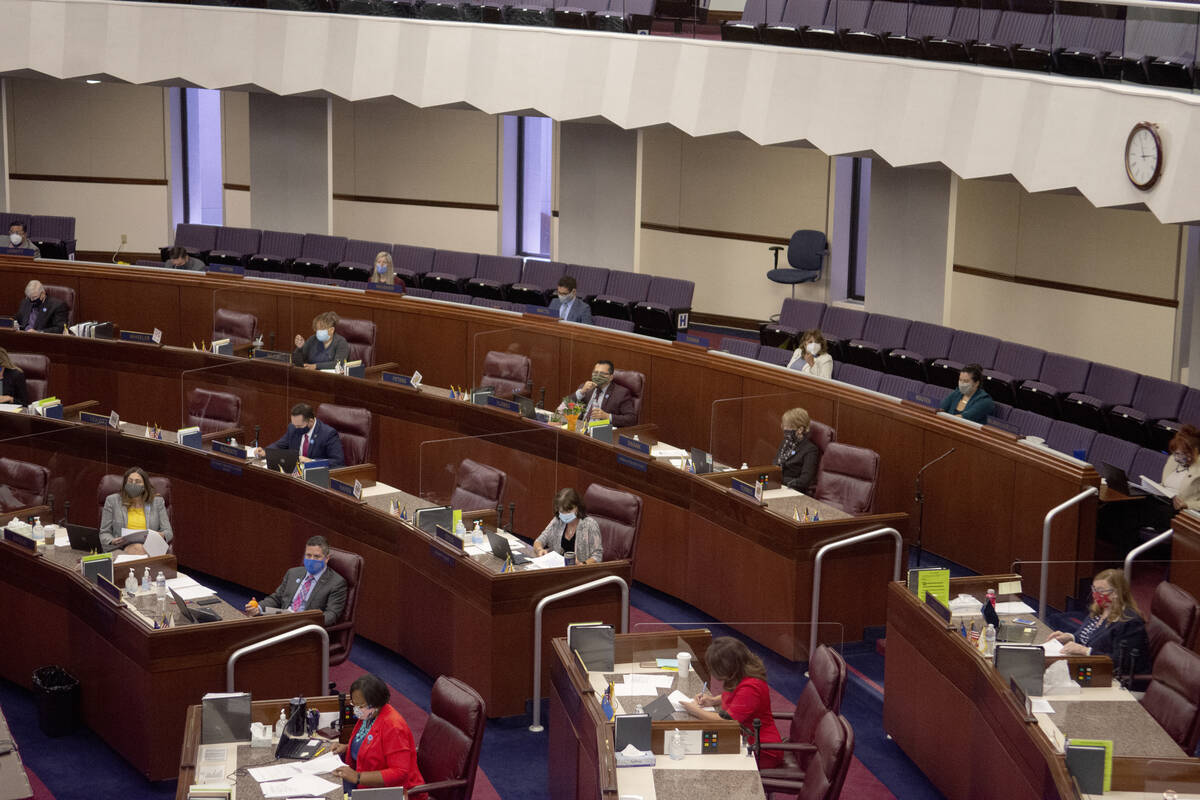EDITORIAL: Court must act on separation of powers cases
For decades, the Nevada Supreme Court has turned a blind eye as lawmakers of both political parties willfully ignored a bedrock clause of the state constitution. But the time for judicial inertia has ended.
This month, the justices heard arguments in two cases involving public employees moonlighting in the state Legislature. One case challenges the service of nine government workers currently sitting in Carson City. The other seeks to appeal a criminal case prosecuted by Melanie Scheible, a Las Vegas Democrat who works in the Clark County district attorney’s office when she’s not carrying out her duties as a state senator.
Nevada’s constitution states that “no persons charged with the exercise of powers properly belonging” to either the legislative, judicial or executive branch of government “shall exercise any functions, appertaining to either of the others, except in the cases expressly directed or permitted in this constitution.”
This separation of powers clause safeguards against more than just potential conflicts of interest. The nation’s Founders understood that consolidated power is a hallmark of tyranny, and they endeavored to ensure that the levers of state authority were spread broadly among the three branches of government. The writers of Nevada’s guiding document wisely incorporated these concerns.
For nearly a half century, however, lawmakers have disregarded this vital constitutional provision without consequence, winning election to the Legislature while also working for the state executive branch or local governments. Meanwhile, a handful of state attorneys general have issued conflicting interpretations of the clause, and court challenges have usually fallen victim to technicalities involving legal standing and other issues.
This month’s oral arguments in front of the high court represent a significant step forward. And they revealed the utter bankruptcy of the legal reasoning offered by those who would gut the separation of powers principle.
Alex Chen, the Clark County prosecutor tasked with defending Ms. Scheible’s dual service, told the justices that they should make a distinction between high-level government employees and their underlings. Yet the language of the clause in question — “no persons” — is crystal clear and makes no such distinction. Mr. Chen was begging the court to rewrite the constitution on the fly to accommodate the political establishment.
This mimicked the risible argument from an attorney with the Legislative Counsel Bureau — which provides legal advice to lawmakers — who previously told the court that “a deputy district attorney never exercises a function of any branch of government when involved in the prosecution because they are not the district attorney; they assist the district attorney.” Tell the hundreds of Nevadans sitting in jail cells that the prosecutor who put them behind bars doesn’t “exercise any functions” of the executive branch.
During arguments on the more expansive lawsuit targeting nine current government employees sitting in the Legislature, the matter of “standing” was again front and center. Attorneys representing the lawmakers urged the justices to dismiss the complaints, arguing that the Nevada Policy Research Institute, a free-market think tank in Las Vegas that filed the action, lacked sufficient legal justification for its complaint.
Yet the justices in 2016 made it easier to evade strict standing requirements, creating an avenue for cases that involve “significant public importance.” Justice Lidia Stiglich wondered whether NPRI cleared such a hurdle given what appeared to be general apathy among Nevadans regarding the separation of powers. But that’s a dangerous outlook. There has been no groundswell to change the separation of powers provision either, and if anything is of “significant public importance,” it would be the integrity of constitutional stipulations intended to promote liberty and good government.
“If not NPRI at this time, then who?” NPRI attorney Colleen McCarty asked. “And if not now, when you have not only our case, but the three criminal cases related to the separation of powers that you’re dealing with, it is clear that this is an issue that the public is interested in.”
She’s correct. The limp case offered by Ms. Scheible makes it even more difficult for the justices to continue the court’s long pattern of avoiding this pressing matter. The separation of powers is a vital bulwark against autocracy. Ms. Scheible and other lawmakers are free to pursue a constitutional amendment relaxing restrictions on dual service, of course. But until then, they shouldn’t be free to continue pretending the provision doesn’t mean precisely what it says.






















